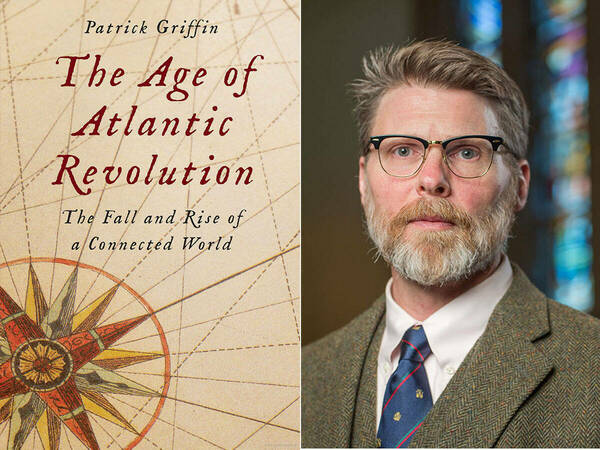
Please join us for an panel discussion marking the publication of The Age of Atlantic Revolution: The Fall and Rise of a Connected World (Yale, 2003) by Patrick Griffin, the Thomas Moore and Judith Livingston Director of the Keough-Naughton Institute for Irish Studies and the Madden-Hennebry Professor of History.
The Age of Atlantic Revolution was a defining moment in western history. Our understanding of rights, of what makes the individual an individual, of how to define a citizen versus a subject, of what states should or should not do, of how labor, politics, and trade would be organized, of the relationship between the church and the state, and of our attachment to the nation all derive from this period (c. 1750–1850).
Griffin shows that the Age of Atlantic Revolution was rooted in how people in an interconnected world struggled through violence, liberation, and war to reimagine themselves and sovereignty. Tying together the revolutions, crises, and conflicts that undid British North America, transformed France, created Haiti, overturned Latin America, challenged Britain and Europe, vexed Ireland, and marginalized West Africa, Griffin tells a transnational tale of how empires became nations and how our world came into being.
This event will bring Griffin into conversation with a panel of experts on the Early Modern Atlantic World and Age of Revolution. A reception will follow the panel discussion.
About the Panel

- Eliga Gould, is professor of history at the University of New Hampshire. He has written extensively on the American Revolution, emphasizing the entangled history that Americans shared with the rest of the Americas, as well as with Africa, Europe, and the wider world. In 2025-26, he will be Harmsworth Professor of American History at Oxford. His current book project, Crucible of Peace, is a global history of the least studied of the United States’ founding documents: the Treaty of Paris that ended the Revolutionary War.
- Samuel K. Fisher, is assistant professor of history at Catholic University of America, and visiting fellow at the Keough-Naughton Institute (2023-24). He is the author of The Gaelic and Indian Origins of the American Revolution: Diversity and Empire in the British Atlantic, 1688-1783 (Oxford University Press, 2022). While at the Keough-Naughton Institute he will be working on his current book project, 1641, 1675: A Transindigenous History, which brings together methods and materials from the interdisciplinary fields of Native American and Indigenous Studies (NAIS) and Irish-language studies to offer a new, comparative history of the Irish Rebellion of 1641 and King Philip’s War.
- Anna Vincenzi, is assistant professor of modern European history at Hillsdale College, Michigan, where she teaches courses on the Western intellectual tradition, American history, and modern European history. She is currently working on a book manuscript that investigates views of the American Revolution in the Italian States, and how those views (and the conception of “revolution” itself) changed after the outbreak of the French Revolution.
- The panel will be introduced and moderated by Elisabeth Köll, professor of history and William Payden Collegiate Chair of the Department of History, University of Notre Dame.
Originally published at irishstudies.nd.edu.